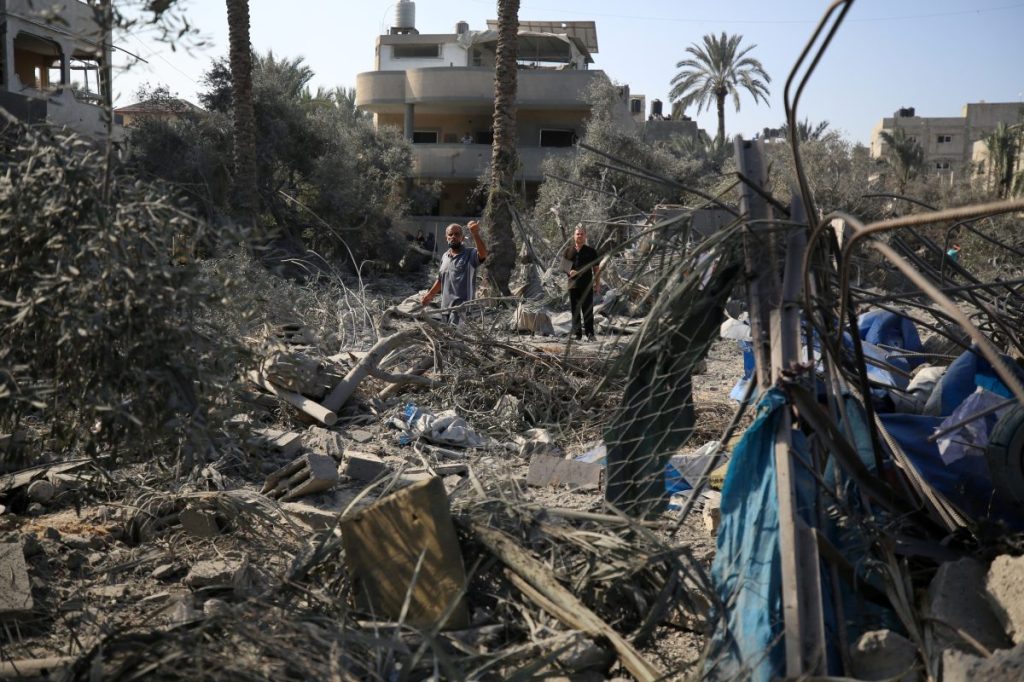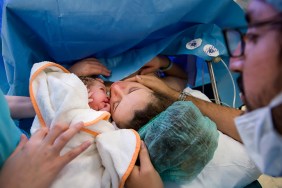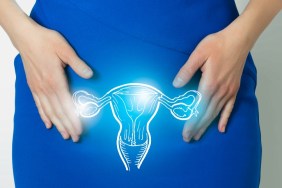In the heart of conflict-ridden Gaza, Noor Hammad, one of approximately 50,000 pregnant women in the region, faces giving birth under the shadow of violence and destruction. The Guardian sheds light on mothers-to-be’s hardships and uncertainties amid a war-torn environment.
A Life Shattered
On the 6th of October, Noor Hammad started her day as usual, working as a nutritionist at a clinic in Deir al-Balah, central Gaza. She and her husband had been preparing for the arrival of their first child, eagerly decorating a room for the newborn. However, their world shattered after their house was destroyed in airstrikes, forcing them to flee to the south of Gaza.
Currently residing in her sister’s cramped two-bedroom home in Khan Younis, Noor shares a floor with 25 other family members. What was once an anticipation for her baby’s arrival has turned into fear over her child’s safety. And the logistics of giving birth in a war zone. Noor laments, “I have no idea where I will give birth to my daughter and how I will receive her without shelter or clothes. I don’t have anything.”
A Healthcare Crisis in Gaza
The situation for expectant mothers in Gaza is dire. The UN Children’s Fund (Unicef), the UN Population Fund (UNFPA), the World Health Organization, and other agencies have sounded the alarm. With 14 out of 35 hospitals and 46 out of 72 health centers either destroyed or no longer functioning, approximately 180 women a day are giving birth without proper medical care. This includes undergoing cesarean sections without pain relief and being discharged shortly after delivery while still bleeding. These agencies warned of the horrifying conditions women are facing, saying in a joint statement, “Some women are having to give birth in shelters, in their homes, in the streets amid rubble, or in overwhelmed healthcare facilities, where sanitation is worsening, and the risk of infection and medical complications is on the rise.”
The healthcare facilities that remain open are overwhelmed, primarily treating people injured in airstrikes. Maternal deaths are expected to rise due to the lack of access to adequate care, according to the agencies. The psychological toll has led to a significant increase in stress-induced miscarriages, stillbirths, and premature births.
Dr. Zaher Sahloul, president of the aid group MedGlobal, emphasizes the grim reality, stating, “As hospitals turn off the last of their equipment due to a lack of fuel, neonatal wards are falling dark, and newborns and mothers are suffering. These are among the saddest, yet easily preventable, tragedies.”
Noor Hammad herself has witnessed the daily chaos healthcare workers face while volunteering at Gaza’s Nasser Hospital. Injuries are treated in hospital courtyards and corridors, and complete surgical operations are performed without sterilization or anesthesia. Despite her own pregnancy, she feels it is the least she can do to assist her fellow citizens.
No Relief in Sight
Hammad’s plight reflects the grim state of healthcare in Gaza. She has been unable to see a doctor to check on the health of her baby. The chances of receiving adequate care for childbirth are slim, given the current overwhelming demand for healthcare resources. “I am not ready at all to give birth because hospitals at present do not receive cases similar to mine due to the number of injuries [they are dealing with],” she confides.
In the midst of these hardships, Noor Hammad walks to a UNRWA (United Nations Relief and Works Agency for Palestine Refugees in the Near East) center two or three times a week to collect tinned food and drinking water. However, the provisions are insufficient for her large family, and she worries about the potential harm to her unborn child from poor nutrition and polluted or salty water. She shares, “I eat some foodstuffs with preservatives added to them that harm my health and the health of my fetus. My health and psychological condition are not good. I cannot describe the extent of my suffering; all of our dreams have been destroyed. I hope this war will end, and I can give birth to my daughter in peace.”








